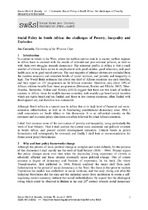| dc.contributor.author | Conradie, Ina | |
| dc.date.accessioned | 2021-07-22T10:10:37Z | |
| dc.date.available | 2021-07-22T10:10:37Z | |
| dc.date.issued | 2018 | |
| dc.identifier.citation | Conradie, I. (2018). Social policy in South Africa: The challenges of poverty, inequality and exclusion. Social Work and Society, 16(2), 1–9. | en_US |
| dc.identifier.issn | 1613-8953 | |
| dc.identifier.uri | http://nbn-resolving.de/urn:nbn:de:hbz:464-sws-1659 | |
| dc.identifier.uri | http://hdl.handle.net/10566/6428 | |
| dc.description.abstract | South Africa is currently emerging from a political and socio-economic crisis. A political faction largely based on patrimonialism threatened to destroy the economy and thus social service delivery. With the recent election of Cyril Ramaphosa as State President a new start has been made to build a successful economy which can act as a base for pro-poor policies. This process will however not be easy. Although South Africa is known as the welfare leader in Africa, with 45.5% of its population receiving welfare grants, these social grants are not large enough to alleviate poverty, and almost 54% of the population remains under the poverty line. The National Planning Commission of South Africa is attempting to institute a comprehensive social security floor to cover all possible needs of the poor and excluded, but with the numbers cited above this remains a difficult undertaking. | en_US |
| dc.language.iso | en | en_US |
| dc.subject | National development plan | en_US |
| dc.subject | Inequality | en_US |
| dc.subject | Exclusion | en_US |
| dc.subject | Social policy | en_US |
| dc.subject | South Africa | en_US |
| dc.title | Social Policy in South Africa: The challenges of poverty, inequality and exclusion | en_US |
| dc.type | Article | en_US |

